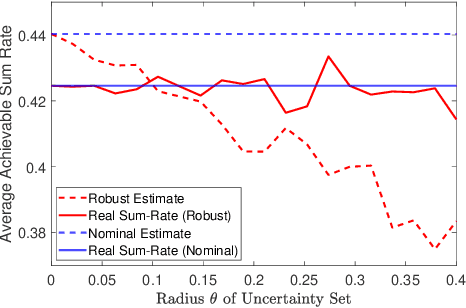Robust Waveform Design for Integrated Sensing and Communication
Paper and Code
Oct 31, 2023



Integrated sensing and communication (ISAC), which enables hardware, resources (e.g., spectra), and waveforms sharing, is becoming a key feature in future-generation communication systems. This paper investigates robust waveform design for ISAC systems when the underlying true communication channels (e.g. time-selective ones) are not accurately known. With uncertainties in nominal communication channel models, the nominally-estimated communication performance may be not achievable in practice; i.e., the communication performance of ISAC systems cannot be guaranteed. Therefore, we formulate robust waveform design problems by studying the worst-case channels and prove that the robustly-estimated performance is guaranteed to be attainable in real-world operation. As a consequence, the reliability of ISAC systems in terms of communication performance is improved. The robust waveform design problems are shown to be non-convex, non-differentiable, and high-dimensional, which cannot be solved using existing optimization techniques. Therefore, we develop a computationally-efficient and globally-optimal algorithm to solve them. Simulation results show that the robustly-estimated communication performance can be ensured to be practically reachable while the nominally-estimated performance cannot, which validates the value of robust design.
 Add to Chrome
Add to Chrome Add to Firefox
Add to Firefox Add to Edge
Add to Edge